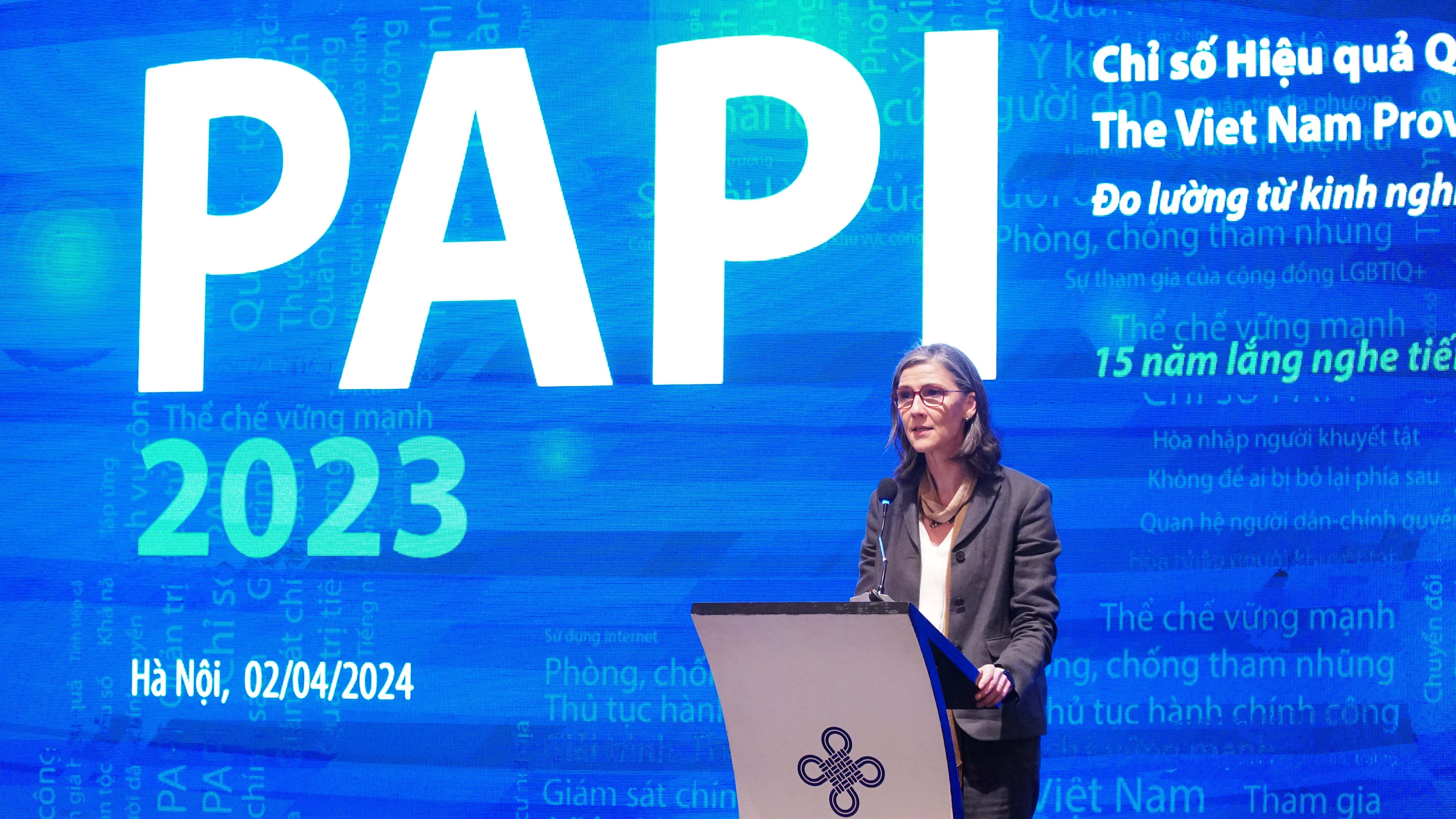Official Launch of 2023 PAPI Report
April 2, 2024

Opening remarks by UNDP Resident Representative in Viet Nam Ramla Khalidi
Dr. Duong Trung Y, Vice President of the Ho Chi Minh National Academy of Politics;
Excellency Andrew Goledzinowski, Australian Ambassador to Viet Nam;
Excellency Deirdre Ní Fhallúin, Irish Ambassador to Viet Nam;
Dr. Duong Trung Y, Vice President of the Ho Chi Minh National Academy of Politics;
Excellency Andrew Goledzinowski, Australian Ambassador to Viet Nam;
Excellency Deirdre Ní Fhallúin, Irish Ambassador to Viet Nam;
Distinguished representatives of the Government of Viet Nam and the diplomatic community;
Representatives of the Viet Nam Fatherland Front, mass organizations, non-governmental organizations and the media;
Ladies and Gentlemen,
It is with great pleasure that I welcome you to the launch of the 2023 PAPI report.
Today we mark the program’s 15-year anniversary.
Launched in 2009, PAPI has evolved into a trusted, citizen-centric tool to support effective, inclusive, and accountable local governance in Viet Nam.
To date, it has captured the voice of nearly two hundred thousand citizens of diverse backgrounds and across all provinces on their experience with local governance.
In so doing, PAPI has sought to contribute to inclusive development in Viet Nam.
It has provided a wealth of data on citizen needs and priorities to inform the design and implementation of national policies and laws aimed at better serving the people.
It has informed action plans by all 63 provincial governments.
And it has been used by the central government to track Viet Nam’s progress towards the Sustainable Development Goals.
Ladies and Gentlemen,
Continuing this tradition, the 2023 PAPI report captures the views of almost 20,000 respondents across 63 provinces. This is a record number for PAPI.
Policymakers and service providers across different sectors and regions will find a wide breadth of data and analysis to inform their efforts.
Allow me to highlight three, key findings that stood out for UNDP.
First, we were encouraged by citizen perceptions that certain types of corruption in the public sector had improved at the local level.
This is welcome progress, especially considering that, year after year, corruption indicators are those most prominently determining overall citizen satisfaction with local governance.
Yet not all results related to corruption were positive.
For example, many respondents – over one third – still believe that informal payments are needed to secure state employment.
Closely related to corruption, transparency in local decision-making saw a drop in 2023.
For example, transparency around poverty lists was seen to decline.
The 2023 PAPI results, therefore, paint a mixed picture.
While citizens saw progress in some forms of corruption in local administration – and we should celebrate this – other types of corrupt practices are seen to persist.
This undermines citizen trust.
Diagnosing and addressing the structural weaknesses that create opportunities for corruption is vital for long-term good governance.
This takes me to the second, encouraging finding of the 2023 PAPI results: access to e-governance rose relative to 2022.
Around the world, e-governance has expanded access to critical services and reduced opportunities for corruption like taking bribes in exchange of services.
It is thus positive to see an upward trend in the percentage of respondents using national and provincial e-portals, even if overall numbers remain very low.
Inclusive access to e-services requires that we close digital divides, focusing especially on ethnic minorities and rural populations.
Finally, before closing, I would like to highlight the issues of greatest concern to respondents in 2023.
Poverty. Hunger. Jobs. And economic growth.
These concerns suggest that, while the country continues to achieve impressive economic growth, many Vietnamese are worried about their socio-economic wellbeing. About their future.
They worry they may be left behind.
Understanding which population groups, regions and communities are not fully benefiting from Vietnam’s fast-paced development is critical.
Migrants, ethnic minorities, and rural areas merit our special attention.
These same population groups are the most anxious about environmental governance – another PAPI dimension. And about the impact of climate change on their livelihoods.
Ladies and gentlemen,
PAPI is made possible by numerous partners and individuals.
We are first and foremost grateful to survey respondents across the country.
We are grateful to the Viet Nam Fatherland Front.
To the Ho Chi Minh National Academy of Politics.
And to provincial governments for their trust and engagement, year-after-year.
Finally, we are grateful to Australia and Ireland for their generous support.
As we celebrate 15 years of PAPI, let us recommit ourselves to putting citizens at the heart of local governance.
By listening to their voices, Viet Nam’s local governments can continue being motors of the country’s inclusive development.
Thank you. Xin cám ơn!

 Locations
Locations



